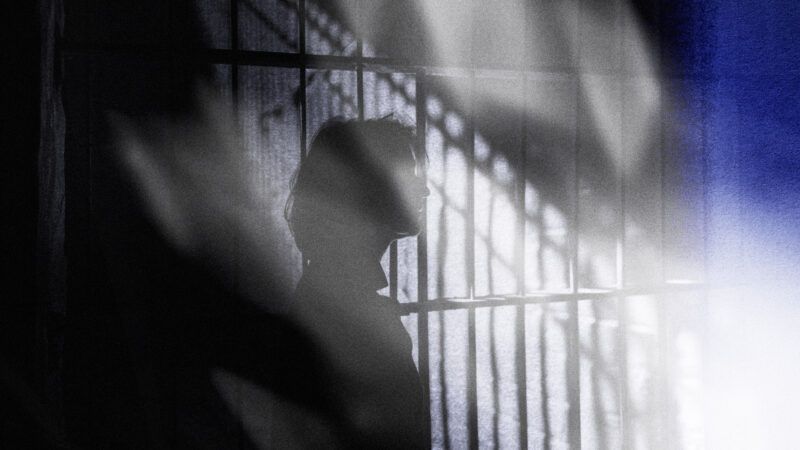Biden Administration Seeks Overly Harsh Sentences for Blocking Abortion Clinic Access
Whatever you think of abortion, the Department of Justice's latest approach to these cases is misguided.

A federal judge late last month handed down the final sentence in a string of high-profile prosecutions related to a protest at an abortion provider in Washington, D.C. That defendant, Paulette Harlow, 75, received two years in prison for helping block an entrance to a clinic in October 2020.
She joins nine other defendants who received sentences from 10 to 57 months' incarceration.
That the group broke the law is basically beyond debate. Whether or not the law under which they were prosecuted should be a law at all, however, is not—a question worth interrogating regardless of where you fall on the pro-choice to pro-life spectrum.
On October 22, 2020, Lauren Handy, who organized the protest and received almost five years in prison, secured access to the Washington Surgi-Clinic by booking an appointment under a fake name. The scene was, according to prosecutors, chaotic: Several of the defendants proceeded to block the way into the procedure area by chaining themselves together, and one nurse reportedly fell and sprained an ankle after another defendant, Jay Smith, 34, shoved a door open. (Ironically, he received the shortest sentence—10 months—because he declined to go to trial.)
Core to the case is the Freedom of Access to Clinic Entrances (FACE) Act, a 1994 law making it a federal crime to engage in "violent, threatening, damaging, and obstructive conduct intended to injure, intimidate, or interfere with the right to seek, obtain, or provide reproductive health services." The necessity of that law is disputable when considering that offenses like trespassing are already crimes. That's not to say the defendants acted blamelessly; they didn't. It is to say that the criminal code is extremely bloated, and the FACE Act arguably further criminalized conduct that was already illegal.
But that point is especially relevant in the context of how the Department of Justice (DOJ) under President Joe Biden's administration pursued this case and related cases. Not content just with the FACE Act, prosecutors paired it with another federal offense: conspiracy against rights, which criminalizes conspiring "to injure, oppress, threaten, or intimidate any person" who is in the process of exercising a legal or constitutional right.
Prosecuting these offenses in tandem gave the government an opening to secure sentences that were, in this writer's view, clearly disproportionate to the criminal conduct, regardless of one's political views. Fifty-seven months—the sentence Handy received—is, for example, the same punishment a federal judge last month handed to a Hawaii man who allegedly defrauded 42 investors out of $1.2 million. There is a disconnect here.
At Harlow's sentencing, her husband, John, asked for mercy, invoking her age and reportedly declining health. Judge Colleen Kollar-Kotelly of the U.S. District Court for the District of Columbia declined to oblige and replied that she should "make every effort to remain alive…because that is part of the tenets of your religion." Do even the most avid pro-choicers think this woman should potentially die in prison for this?
The conversation around this issue, and these prosecutions specifically, has been fraught, to put it mildly. Several viral posts claiming Harlow was arrested and sentenced for "praying outside an abortion clinic" may be intoxicating for those who feel aggrieved by this administration's hard-line approach to such protests. They are also false. That conduct—praying outside a clinic—indeed remains protected by the First Amendment, and advocates undermine their cause when they mislead to generate support. The truth here is ridiculous enough. It doesn't require embellishment.
It is also true that the protesters here were not innocent of legal wrongdoing—something that even the staunchest pro-lifers should be able to recognize. Inherent to the concept of civil disobedience is the notion that protesters are willing to break the law and be punished for it if they believe their cause is righteous enough to merit such a sacrifice.
Whether or not it was effective here is also a worthy question. Lying to get into a clinic and keeping patients from entering may hinder abortion efforts in the very short term, but in the long term it mostly amounts to flamboyant performance art. If changing hearts and minds was the goal, then talking with patients and praying outside the clinic—what some erroneously believe these defendants are going to prison for—may ironically have been the superior option.
That still doesn't negate the absurdity of those prison terms. Biden ran for office in part on a promise that he had rethought his tough-on-crime past. It is possible for him to balance that with his pro-choice plank. It appears he has chosen not to.


Show Comments (40)